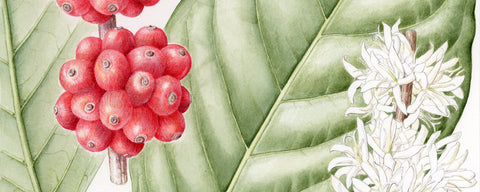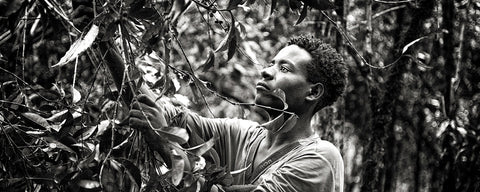Imagine if coffee disappeared? With global temperatures continuing to rise, more frequent extreme weather conditions and an increase in coffee-related pests and diseases, there are turbulent times ahead for coffee cultivation. As a significant agricultural product across the world, a lack of coffee is not just a problem we face at our coffee shops – coffee is a means for livelihood for thousands of families around the world. Ensuring its' future is essential.
Our Impact Strategy guides our work and keeps us on track with our mission to enrich life through our relentless focus on great quality and sustainable sourcing. It’s built around three pillars: Quality of Life, Quality of Business, Quality of Coffee. Inclusive, diverse, bright: our strategy has been built with the future in mind, ensuring no one, people, planet or coffee, gets left behind.
Different species and varieties of coffees vary in their resistance to climate, pests and diseases. At Union, we only roast speciality Arabica coffee, known for its superior quality. It has a mean annual temperature requirement of around 19⁰C, which means the long-term viability of Arabica is at risk when global temperatures rise. While the Robusta species is a lot more resilient to hot temperatures, it is much lower in quality.
In 2020, we were proud to be involved in a study by Royal Botanic Gardens, Kew, University of Greenwich, CIRAD and Sierra Leone into Coffea Stenophylla, a species that may be one of the answers towards a future of climate-resistant and high-quality coffee.
 (Image credit: M Smith - Missouri Botanical Garden)
(Image credit: M Smith - Missouri Botanical Garden)
What is Stenophylla?
A somewhat “forgotten” and, in fact, nearly lost species of coffee, Stenophylla was originally farmed across West Africa from the early 1800s and into the twentieth century. When Robusta, known for being highly productive as well as resistant, became more popular to farmers, Stenophylla largely fell out of favour.
With temperatures rising, coffee species with higher resistances are becoming essential to the future of coffee – Stenophylla is one of these species. In 2020, after years of searching for Stenophylla, co-authors of the study, Dr Aaron Davis (Head of Coffee Research at the Royal Botanic Gardens, Kew) along with Dr Jeremy Haggar (Professor of Agroecology at the University of Greenwich), discovered enough trees in Sierra Leone to provide a sample of coffee to taste.
First tasting of stenophylla in 200 years
We were honoured to play a small role in Dr Aaron Davis and Dr Jeremy Haggar’s study, participating in the first tasting of Stenophylla in 100 years. Through doing so we were able to provide both essential and groundbreaking information to the study.
In our tasting, we discovered a high-quality coffee with a complex flavour profile that resembled a Rwanda Arabica. The Arabica species is particularly threatened by climate change, which means wide availability of high quality coffee may, in time, be at risk. The discovery that Stenophylla, a climate-resistant species is displaying remarkable, high-quality attributes is an optimistic step for the future of speciality coffee.
Looking ahead, there is a lot more work to be done to make Stenophylla viable for producers to use but, importantly, it’s bringing a wider genetic material onto the scene. A further tasting at CIRAD corroborated our first sensory evaluation for Coffea Stenophylla.



